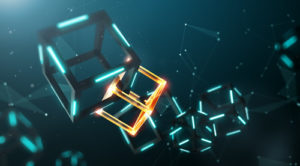At Central New Mexico Community College (CNM), empowering students is an important goal, says Tobe Phelps, senior director of online college. Giving students a permanent, secure digital record of their accomplishments that they can take with them when they graduate aligns perfectly with this objective.
“When we issue a diploma to a student, that diploma still belongs to the college, and the student must get a certified copy from us,” Phelps says. “If they try to get a job or move on to another college, all of those (entities) have to come back to us for validation of the student’s credentials.”
By using a technology called blockchain, “we’re able to take that certification and give it to the student as an official record they own themselves,” he says. “We can be completely out of the circle.”
Updating the credentialing process
Blockchain is the technology that Bitcoin and other crypto-currencies use to record financial transactions. In academia, a small but growing number of colleges and universities are using blockchain to confer degrees and certificates—and supporters of the technology believe it could revolutionize the credentialing process.
Related: Where is blockchain technology going in the future?
A blockchain is a secure digital ledger of transactions in which each block builds on the previous one, making the entire chain immutable. When used to record financial transactions, a blockchain indicates the history of who sent and received the currency and how much it’s worth.
The same concept underlies the use of blockchain for academic credentialing. Every new degree, certification, digital badge, or other honor that students earn throughout their lives would be added to this record like links in a chain, and these credentials would be tamper-proof to give employers some assurance that students actually earned them.
With paper or digital transcripts, colleges and universities own this information—and students or alumni must engage in a tedious process to access these records or share them with employers. The promise of blockchain is that it will allow students to maintain their own academic record in a way that can’t be tampered with—while continuing to build on this record throughout their career.
After a small pilot program with coding students proved successful, CNM gave all students the option to receive their diploma using blockchain technology this past summer.
“We will continue to issue these digital certificates to all students going forward, but they don’t have to activate them if they choose not to,” says Phelps. “We will also give students a paper certificate for the foreseeable future. There are plenty of logistical issues to sort out, especially with our population of students. Not all of them are going to be in a position to use a digital certificate.”
Launching a digital certificate program
CNM is using technology from a software company called Learning Machine to issue the digital certificates. Learning Machine has built a toolkit of open-source components that any developer, school, student, or employer can use to create, issue, view, and verify blockchain credentials. The toolkit is available free of charge at Blockcerts.
Other institutions using the technology include the Massachusetts Institute of Technology, Carnegie Mellon University, and Southern New Hampshire University.
Related: MIT issues learner-owned digital diplomas on the blockchain
Whether blockchain ultimately transforms the credentialing process depends on how employers respond to the technology. Communicating with students and area employers about blockchain has been a key to CNM’s success, Phelps notes. Despite some early confusion about the technology, he believes employers are recognizing its value—especially once they see it in action.
“We thought it was going to be a slow adoption curve among employers, and we’re actually getting quite a bit more use than we anticipated,” he says. “Joe’s auto mechanic shop on the corner doesn’t care about blockchain, but our larger employers in Albuquerque have gotten on board.”
Tying everything together
In the next phase of its blockchain initiative, the college plans to issue micro-credentials to students. These micro-credentials will prove to employers that students can demonstrate the soft skills they desire, such as communication or email etiquette.
“When we talk to employers, that’s the number-one thing we are asked for,” says Phelps. “They’ll say something like: ‘I can teach them to do the job. I can’t teach them to think critically or show up on time.’”
When the college bundles micro-credentials into students’ blockchain certificates, students will be able to graduate with a diploma, a transcript, and micro-credentials that “show to employers in a verifiable fashion: Here are the skills that I learned that will help me do my job more effectively.”
- Using real-world tools to prepare students for the workforce - April 18, 2024
- 8 top trends in higher education to watch in 2024 - April 16, 2024
- Defining a path to equitable AI in higher education - April 12, 2024

